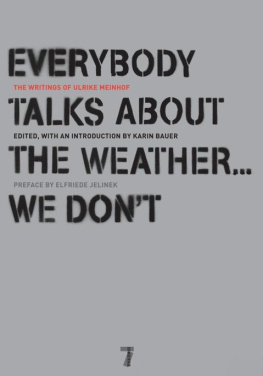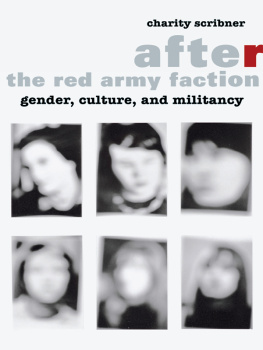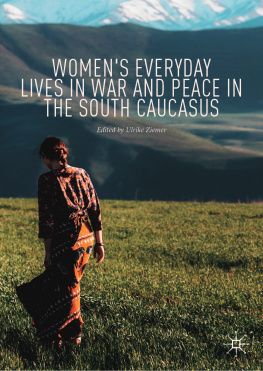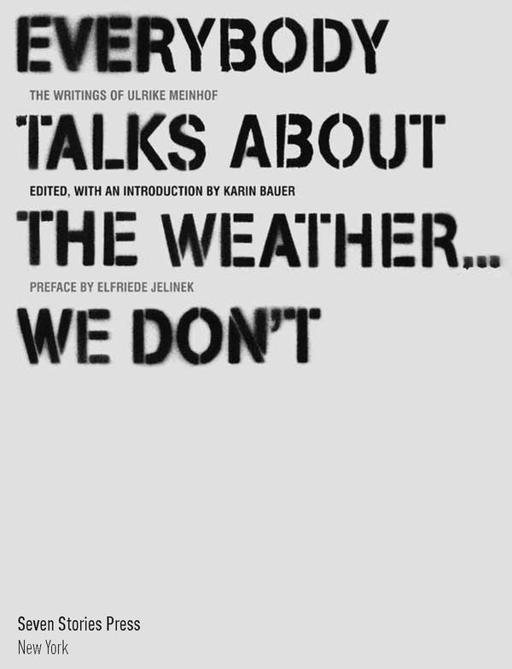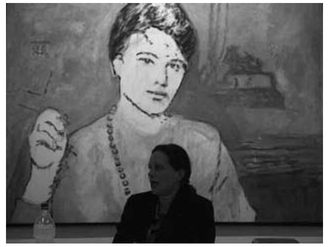Table of Contents
ULRIKE MARIE MEINHOF
ELFRIEDE JELINEK
Ulrike Meinhof is a historical riddle, an enigmatic woman, who like most people, can only be understood within the context of her time. She seized a historical moment and the possibilities it offered, a moment of the starkest contradictions in postwar Germany, a moment that spans Germanys coming to terms with its partially suppressed Nazi past, the student movement of 1968, and the re-unification, which Ulrike Meinhof did not witness, and could probably not have imagined. I believe this historical moment of the RAF (Red Army Faction) and all the effects it had is still not fully understood even though it was so consciously experienced by so many, yet differently by every single one. With the exception of the left-wing group of readers of konkret, most Germans refused Ulrike Meinhofs texts from the very start; and so this historic moment passed and the attitude of not wanting to know added to a greater sense of isolation and lack of historicity in German postwar society. It also led to Meinhof herself becoming increasingly embittered. It is tragic to read her engaged texts about outsiders (she was especially concerned about institutionalized children), and find the tone of her work getting more and more apodictic, demanding, and self-righteous, a tone that in the end tramples everything down, every possible objection, perhaps from desperation because her texts have so little influence, perhaps for private reasons; and then to have a brutally commanding tone set in that is already very like the pitiless barked commands we find in her later texts from the underground, commands that today seem to carry the echo of the dark era she detested. This is truly a tragedy. And the way Meinhof was destroyed within and by the group she had joined and that became her life, in a situation that seemed to offer no exit route but suicide by hangingthis remains incomprehensible to me, as does any suicide. Terrifying and tragic, but also a missed opportunity for society to learn from this woman when she still had something to say that we could understand if only we wanted to.
IN SEARCH OF ULRIKE MEINHOF
KARIN BAUER
While I was rushing one evening in May 2007 to an art exhibit entitled On Love, the underground station was closed and passengers were rerouted to take various buses. Unsure how to continue my journey, I asked a fellow passenger for advice. She was a friendly, unassuming, middle-aged woman wearing short hair and a conservative dress. She gave me directions, and we struck up a conversation. When I told her I was in Berlin to to prepare an edition of columns by Ulrike Meinhof in English translation, her face lit up: Thats great! she exclaimed, absolutely wonderful. Ulrike was very important to us. When she died, I cried. The woman fell into a pensive mood, and before I reached my destination and took my leave, she reminisced about her feeling of deep sadness over the death of a woman who had led a struggle with whose impetus she had sympathized, even as she had rejected its violent means.
At the Galerie Nord about fifty people had gathered to view the art work and listen to Ulrike Meinhofs daughter, Bettina Rhl, read from her book about her mother, father, and their magazine konkret. Rhl sat in front of a painting of her mother by German artist Gregor Certen. Some people in the audience said that they found it counterintuitive to speak of a terrorist like Meinhof within the framework of an exhibition on love. One of the organizers explained that the idea of including Certens painting and of inviting Rhl originated with the idea of including in the show a representation of the notion of love of ones country. The organizers thus situated Meinhofs life and work within the context of patriotisma hotly contested notion in German post-National Socialist society.
Some in the audience spoke of the new nationalism since German reunification in 1989 that had led some of the old radical Left to switch sides and align themselves with the nationalist Right. One person speculated that Meinhof, had she lived, would perhaps have done the same. While many in the audience interpreted the theme of love in personal and private terms, one personvery obviously nostalgic for the old radical Leftpicked up on the theme of love for ones country. Your mother was a courageous woman, he told Rhl. Meinhof, he explained, took seriously the moral obligation to fight against injustice. He interpreted her fight as an expression of her love for humanity. Others countered that Meinhof was, after all, responsible for murdering people. What does that have to do with love or courage?
Photograph of Bettina Rhl with a painting of her mother, Ulrike Marie M., by Gregor Certen, 1999. PHOTO BY KARIN BAUER, 2007
The discussion continued for quite some time as Rhl attempted to walk the fine line between two seemingly conflicting roles: that of journalist, there to present the findings of her research, and that of a daughter whose mother had abandoned her to pursue militant left-wing politics.
The passionate responses to the Meinhof exhibit testified to the deep roots that her image has in the German imagination and, indeed, they testified to the trauma that is connected with her name. They also provoked other questions: What hides behind these reactions to Meinhof? What is covered up, diverted, repressed, and projected on to her image? More than thirty years have passed since Meinhofs death, but her legacy lives on. For complex reasons that may be rooted as much in emotional as in rational ground, Meinhofs ghost still haunts contemporary German society.
The response to Meinhofs death in her prison cell in Stuttgart-Stammheim on May 8, 1976 was epic. Protests and riots took place in Germany and in major European cities. Bombs exploded in Paris, Rome, Toulouse, and Nimes. A police officer was seriously burned in an explosion in Frankfurt. In Berlin more than four thousand mourners gathered to attend a funeral march.
The eclectic crowd of mourners included members of the liberal establishment, prominent intellectuals, writers, journalists, publishers, artists, activists, and dignitaries of the Protestant church, as well as members of fringe groups and masked activists attempting to keep their identity hidden from photographers, police, and agents of the Federal Bureau for the Protection of the Constitution. There were spontaneous expressions of grief, frustration, and rage, and immediately questions were raised disputing the governments claim that Meinhof had committed suicide in her cell. What is significant is not only the idea that a prisoner would have been murdered by the government in a prison cell, but the fact that so many citizens were willing to entertain the idea that this could be true. Most people accepted the conclusion of the two autopsiesthat Meinhof had killed herselfbut nevertheless argued that while the state had not de facto murdered Meinhof, it had done so through negligence and by subjecting Meinhof to inhumane conditions during her imprisonment. Some argued further that the state had in fact waged psychological warfare against Meinhof.
In his funeral address, the poet Erich Fried called Meinhof the most distinguished German woman since Rosa Luxemburg. Her lawyer Otto Schily, later Germanys Minister of the Interior from 1998 to 2005, expressed the hope that Meinhofs suffering would eventually turn into a sign of hope for humanity. Her publisher Klaus Wagenbach maintained that it was the German conditions that killed Meinhof, the extremism of those who called the debates about changing these conditions extremist. Wagenbach situated Meinhof in the larger political and historical context by pointing out the significance of her date of death: the thirty-first anniversary of the end of Word War II.

